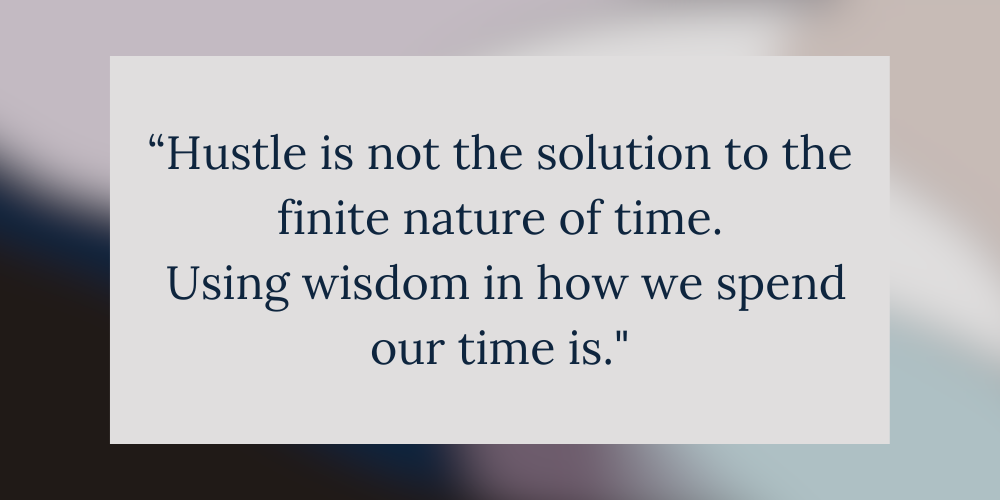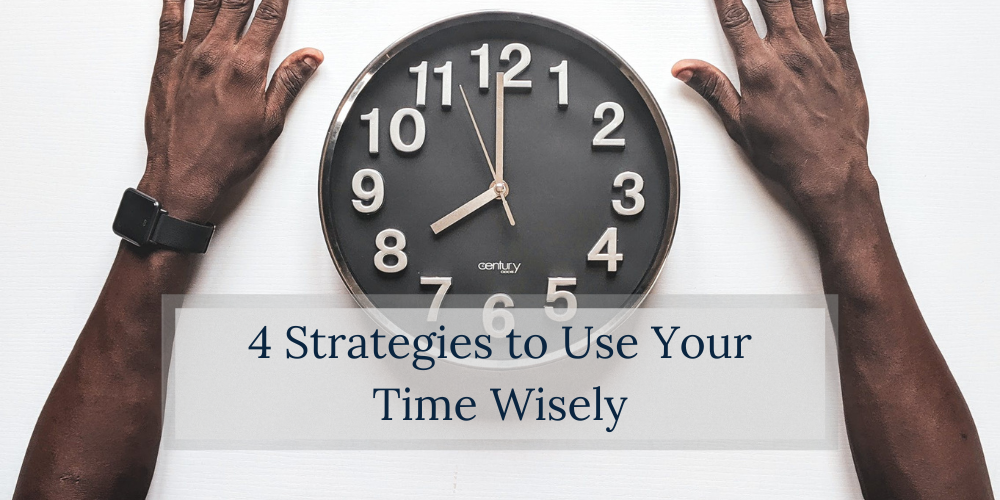I’m sure you have heard the saying “Time is the only limited resource.”
You can make more money. You can hire more people. You can get more customers.
But you will never get more than 24 hours in a day.
And, I’ve seen several memes on the internet that encourage us to hustle more. After all, we have the same 24 hours in a day as Oprah, Bill Gates, or Warren Buffet, right?
Hustle is not the solution to the finite nature of time.
Using wisdom in how we spend our days and hours is.

There are four tricks that I use to spend my own time wisely, and I recommend them to my clients as well.
4 Strategies to Use Your Time Wisely
1. Set Boundaries
If you love what you do, it is easy to get in the habit of working all the time- nights, weekends, holidays, etc. Your work will soon take over and negatively affect other areas of your life unless you set boundaries.
If you don’t set boundaries in your schedule, everyone will assume you are available 24/7 and treat you accordingly.
That’s why setting boundaries is so critical.
First, you should set concrete working hours for each day. Then, once your hours are set, use time blocking to manage your calendar by grouping like activities together, allowing you to be as efficient as possible. Michael Hyatt shared an excellent example of how he schedules his week that is a good pattern to follow.
Setting boundaries is the first step in getting control of your calendar and managing your time well. If you honor these boundaries, it will ensure that you maintain a healthy work-life balance.
2. Manage Your Commitments
Sometimes we say yes to a commitment, but our actions say no. Every time we fail to follow through, show up late, don’t complete a project on time, or fail to keep our voicemail’s promise to “return your call as soon as possible,” you are saying no and that you are not fully committed to your work.
In many cases, this is unintentional, and it happens because you simply don’t have a good system to manage and track the things you have committed to.
A system could be as simple as making notes on a sheet of paper, or as complex as adopting a project management system like Workamajig. The tool you choose is far less important than the process of tracking your commitments.
To get started, set aside 30 minutes to do “mind-dump” of every commitment you have made to yourself, your friends, your spouse, your kids, your co-workers, etc.
Once your list is complete, look for commitments that you complete quickly. For example, maybe you promised to call your mom last week, and you still haven’t made the call. Take 5 minutes to call her and fulfill this commitment.
I promise, creating a system to manage your commitments will bring you immense relief and peace.
3. Prioritize Your Tasks
When we are overwhelmed with a long list of to-dos, it can be hard to identify what is really important and which tasks you should tackle first.
After you have done a mind dump and have completed any task that took 5 minutes or less, you likely still have a lot to do. Now it’s time to use the Eisenhower Matrix to put each task into a specific category:
- Urgent and important
- Important but less urgent
- Urgent but less important
- Less urgent and less important
Focus on completing the tasks in the urgent and important category first.
This approach will help you appropriately prioritize all of your tasks.
The truth is, at any given point in time, very few tasks and projects are truly essential. Get in the habit of identifying the essential two or three things that much be done each day, and focus on completing those.
The truth is, at any given point in time, very few tasks and projects are truly essential.
4. Plan Each Day
It’s no secret that to be successful with your finances, you must decide where your money will go before it comes in. This is known as budgeting.
We should take the same disciplined approach to our time.
Remember, unlike money, we can’t earn more time, so we should be even more diligent about budgeting our hours than we are our money.
When you plan each day and create your ideal week as we talked about before, make sure you are getting your big rocks in first.
Those things that are most important to you must be scheduled into your day, or they will likely never happen.
Annie Dillard once said, “How we spend our days is, of course, how we spend our lives.” I hope that in this new year and new decade, you are intentional about spending your time wisely.
For personalized, expert advice, don’t hesitate to get in touch with us. You can schedule a complimentary 45-minute discovery call by contacting our team here today.





